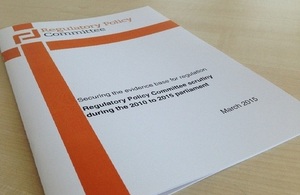Securing the evidence base for regulation
Securing the evidence base for regulation: Regulatory Policy Committee scrutiny in the 2010 to 2015 Parliament

RPC report cover
The Regulatory Policy Committee today published its full report on the Government’s efforts to cut red tape over the course of this parliament. It provides the watchdog’s most complete analysis of the Government’s published savings to business of £2.2 billion per year from changes in law.
The RPC’s analysis also shows that changes which are not counted in the Government’s One-in, One-Out, or One-in, Two-out accounts make up nearly half of all regulatory proposals scrutinised by the RPC over the course of the parliament.
Since 2013, the RPC has validated costs to business of £1.6 billion per year from European regulations that address financial systemic risk and over £700 million per year from a range of other European regulations both of which do not count towards the government’s claimed savings. The RPC identified further changes out of scope of the Government’s rules that could impose an additional £470 million of costs on UK businesses, and around £135 million of benefits, per year.
Michael Gibbons OBE, RPC Chairman, said:
Our report demonstrates that Independent scrutiny is vital to ensure that regulatory reforms are supported by robust evidence and to provide a validated, credible account of their impact. Without RPC scrutiny, the net savings to business claimed by the Government from its regulatory reforms would be £505 million higher than the final validated figure of £2.2 billion per year currently.
Furthermore, for maximum credibility it’s crucial that such scrutiny, and the validation of the impact of regulation, is extended to the fullest range of measures that have an impact on business and civil society.
The RPC analysis found that, in 2014, two-thirds of new regulations affecting business did not include measures to mitigate the impact on small and micro business, with only three out of 83 including a full exemption, and ten measures including a partial exemption. The RPC believes government departments can and should do more to consider how the impacts of regulation on smaller businesses can be reduced.
In reflecting on the achievements of the government across the course of the parliament the report highlights the achievements of mechanisms such as One-in, One-out and One-in, Two-out, and the requirement to develop effective impact assessments to set out the evidence supporting proposals.
Matthew Hancock MP, Minister of State for Business and Enterprise and Energy, said:
The Government’s relentless drive to tackle red tape has saved firms £2.2 billion a year or £10 billion over this Parliament. The RPC has played a vital role in ensuring that burden is independently monitored and so departments take meaningful steps to remove burdens on business, and eliminate pointless rules that get in the way of job creation and growth.
But we cannot afford to take the pressure off. Whitehall must go further and faster to free up small firms, and Europe must stop generating unnecessary rules. The government is fighting hard to ensure UK regulators act and the EU listens to the voice of business and puts growth and jobs first.
Business groups and civil society organisations have welcomed the Regulatory Policy Committee’s final report of this parliament.
Mike Cherry, Federation of Small Businesses, National Policy Chairman, said:
The FSB are strong supporters of the work of the RPC and today’s report neatly demonstrates the important work they do. It is critical that the small business impact of any new policy is understood and rigorously evidenced. In order to lock in the progress the RPC has made in doing this we support measures in the Small Business Bill to put independently evaluated departmental impact assessments on a statutory footing.
John Cridland, CBI Director-General, said:
Accountability and transparency in the regulatory process are key for businesses. The Regulatory Policy Committee (RPC) works hard to improve standards across the board, using its voice at the heart of Government.
As we move forward, businesses will want to feel the impact of cutting red tape, and giving the RPC statutory footing will be a helpful step in the right direction.
Dr Adam Marshall, Executive Director of Policy and External Affairs, British Chambers of Commerce, said:
Businesses value the work of the RPC. It has championed the needs of SMEs, reduced the amount of badly designed regulations and helped to change the culture of Whitehall. Providing the RPC with long-term stability will ensure it continues to effectively perform its important role in the years ahead.
Frances O’Grady, Trades Union Congress (TUC) General Secretary, said:
As an independent body the RPC does an important job in holding the Government to account on regulation and de-regulation and the costs and benefits of regulation to all of us.
Graham Wynn, Assistant Director for Consumer, Competition and Regulatory Affairs, British Retail Consortium, said:
The BRC represents the majority of retailers all of whom are affected by a wide range of regulatory activity. We strongly support the work of the RPC in assessing Impact Assessments and look forward to this being extended to Government sponsored voluntary regulation, as recommended by the BRC, in the near future. We would urge the Government to strengthen the RPC still further by providing recognition in statute and giving it enhanced powers to ensure proposals can only advance on the basis of a fully satisfactory impact assessment.
Terry Scouler, Chief Executive, EEF, said:
The oversight which the Regulatory Policy Committee, (RPC), has brought to the regulatory process has provided a valued platform of transparency and public accountability, one which is now accepted as essential to the process of better regulation. Its independent scrutiny has proved essential in driving down the cost of regulation on business. Now is the time to widen its footprint and broaden its reach, with a statutory, independent basis and greater powers to continuously review all regulation that imposes cost and burden on business.
The Report, will be published at 3pm 3 March 2015 and will be available here.